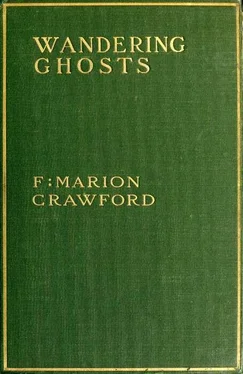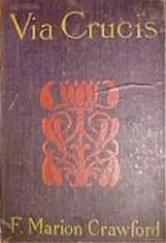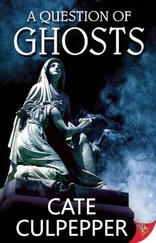F. Crawford - Wandering Ghosts
Здесь есть возможность читать онлайн «F. Crawford - Wandering Ghosts» весь текст электронной книги совершенно бесплатно (целиком полную версию без сокращений). В некоторых случаях можно слушать аудио, скачать через торрент в формате fb2 и присутствует краткое содержание. Год выпуска: 2012, Жанр: Ужасы и Мистика, на английском языке. Описание произведения, (предисловие) а так же отзывы посетителей доступны на портале библиотеки ЛибКат.
- Название:Wandering Ghosts
- Автор:
- Жанр:
- Год:2012
- ISBN:нет данных
- Рейтинг книги:3 / 5. Голосов: 1
-
Избранное:Добавить в избранное
- Отзывы:
-
Ваша оценка:
- 60
- 1
- 2
- 3
- 4
- 5
Wandering Ghosts: краткое содержание, описание и аннотация
Предлагаем к чтению аннотацию, описание, краткое содержание или предисловие (зависит от того, что написал сам автор книги «Wandering Ghosts»). Если вы не нашли необходимую информацию о книге — напишите в комментариях, мы постараемся отыскать её.
Wandering Ghosts — читать онлайн бесплатно полную книгу (весь текст) целиком
Ниже представлен текст книги, разбитый по страницам. Система сохранения места последней прочитанной страницы, позволяет с удобством читать онлайн бесплатно книгу «Wandering Ghosts», без необходимости каждый раз заново искать на чём Вы остановились. Поставьте закладку, и сможете в любой момент перейти на страницу, на которой закончили чтение.
Интервал:
Закладка:
"It's the Woman of the Water," she used to say; and sometimes she would threaten that, if I did not go to sleep, the Woman of the Water would steal up to the high window and carry me away in her wet arms.
The place was gloomy. The broad basins of water and the tall evergreen hedges gave it a funereal look, and the damp-stained marble causeways by the pools might have been made of tombstones. The grey and weather-beaten walls and towers without, the dark and massively furnished rooms within, the deep, mysterious recesses and the heavy curtains, all affected my spirits. I was silent and sad from my childhood. There was a great clock-tower above, from which the hours rang dismally during the day and tolled like a knell in the dead of night. There was no light nor life in the house, for my mother was a helpless invalid, and my father had grown melancholy in his long task of caring for her. He was a thin, dark man, with sad eyes; kind, I think, but silent and unhappy. Next to my mother, I believe he loved me better than anything on earth, for he took immense pains and trouble in teaching me, and what he taught me I have never forgotten. Perhaps it was his only amusement, and that may be the reason why I had no nursery governess or teacher of any kind while he lived.
I used to be taken to see my mother every day, and sometimes twice a day, for an hour at a time. Then I sat upon a little stool near her feet, and she would ask me what I had been doing, and what I wanted to do. I dare say she saw already the seeds of a profound melancholy in my nature, for she looked at me always with a sad smile, and kissed me with a sigh when I was taken away.
One night, when I was just six years old, I lay awake in the nursery. The door was not quite shut, and the Welsh nurse was sitting sewing in the next room. Suddenly I heard her groan, and say in a strange voice. "One—two—one—two!" I was frightened, and I jumped up and ran to the door, barefooted as I was.
"What is it, Judith?" I cried, clinging to her skirts. I can remember the look in her strange dark eyes as she answered.
"One—two leaden coffins, fallen from the ceiling!" she crooned, working herself in her chair. "One—two—a light coffin and a heavy coffin, falling to the floor!"
Then she seemed to notice me, and she took me back to bed and sang me to sleep with a queer old Welsh song.
I do not know how it was, but the impression got hold of me that she had meant that my father and mother were going to die very soon. They died in the very room where she had been sitting that night. It was a great room, my day nursery, full of sun when there was any; and when the days were dark it was the most cheerful place in the house. My mother grew rapidly worse, and I was transferred to another part of the building to make place for her. They thought my nursery was gayer for her, I suppose; but she could not live. She was beautiful when she was dead, and I cried bitterly.
"The light one, the light one—the heavy one to come," crooned the Welshwoman. And she was right. My father took the room after my mother was gone, and day by day he grew thinner and paler and sadder.
"The heavy one, the heavy one—all of lead," moaned my nurse, one night in December, standing still, just as she was going to take away the light after putting me to bed. Then she took me up again, and wrapped me in a little gown, and led me away to my father's room. She knocked, but no one answered. She opened the door, and we found him in his easy-chair before the fire, very white, quite dead.
So I was alone with the Welshwoman till strange people came, and relations, whom I had never seen; and then I heard them saying that I must be taken away to some more cheerful place. They were kind people, and I will not believe that they were kind only because I was to be very rich when I grew to be a man. The world never seemed to be a very bad place to me, nor all the people to be miserable sinners, even when I was most melancholy. I do not remember that any one ever did me any great injustice, nor that I was ever oppressed or ill-treated in any way, even by the boys at school. I was sad, I suppose, because my childhood was so gloomy, and, later, because I was unlucky in everything I undertook, till I finally believed I was pursued by fate, and I used to dream that the old Welsh nurse and the Woman of the Water between them had vowed to pursue me to my end. But my natural disposition should have been cheerful, as I have often thought.
Among lads of my age I was never last, or even among the last, in anything; but I was never first. If I trained for a race, I was sure to sprain my ankle on the day when I was to run. If I pulled an oar with others, my oar was sure to break. If I competed for a prize, some unforseen accident prevented my winning it at the last moment. Nothing to which I put my hand succeeded, and I got the reputation of being unlucky, until my companions felt it was always safe to bet against me, no matter what the appearances might be. I became discouraged and listless in everything. I gave up the idea of competing for any distinction at the University, comforting myself with the thought that I could not fail in the examination for the ordinary degree. The day before the examination began I fell ill; and when at last I recovered, after a narrow escape from death, I turned my back upon Oxford, and went down alone to visit the old place where I had been born, feeble in health and profoundly disgusted and discouraged. I was twenty-one years of age, master of myself and of my fortune; but so deeply had the long chain of small unlucky circumstances affected me, that I thought seriously of shutting myself up from the world to live the life of a hermit, and to die as soon as possible. Death seemed the only cheerful possibility in my existence, and my thoughts soon dwelt upon it altogether.
I had never shown any wish to return to my own home since I had been taken away as a little boy, and no one had ever pressed me to do so. The place had been kept in order after a fashion, and did not seem to have suffered during the fifteen years or more of my absence. Nothing earthly could affect those old grey walls that had fought the elements for so many centuries. The garden was more wild than I remembered it; the marble causeways about the pools looked more yellow and damp than of old, and the whole place at first looked smaller. It was not until I had wandered about the house and grounds for many hours that I realised the huge size of the home where I was to live in solitude. Then I began to delight in it, and my resolution to live alone grew stronger.
The people had turned out to welcome me, of course, and I tried to recognise the changed faces of the old gardener and the old housekeeper, and to call them by name. My old nurse I knew at once. She had grown very grey since she heard the coffins fall in the nursery fifteen years before, but her strange eyes were the same, and the look in them woke all my old memories. She went over the house with me.
"And how is the Woman of the Water?" I asked, trying to laugh a little. "Does she still play in the moonlight?"
"She is hungry," answered the Welshwoman, in a low voice.
"Hungry? Then we will feed her." I laughed. But old Judith turned very pale, and looked at me strangely.
"Feed her? Ay—you will feed her well," she muttered, glancing behind her at the ancient housekeeper, who tottered after us with feeble steps through the halls and passages.
I did not think much of her words. She had always talked oddly, as Welshwomen will, and though I was very melancholy I am sure I was not superstitious, and I was certainly not timid. Only, as in a far-off dream, I seemed to see her standing with the light in her hand and muttering, "The heavy one—all of lead," and then leading a little boy through the long corridors to see his father lying dead in a great easy-chair before a smouldering fire. So we went over the house, and I chose the rooms where I would live; and the servants I had brought with me ordered and arranged everything, and I had no more trouble. I did not care what they did, provided I was left in peace, and was not expected to give directions; for I was more listless than ever, owing to the effects of my illness at college.
Читать дальшеИнтервал:
Закладка:
Похожие книги на «Wandering Ghosts»
Представляем Вашему вниманию похожие книги на «Wandering Ghosts» списком для выбора. Мы отобрали схожую по названию и смыслу литературу в надежде предоставить читателям больше вариантов отыскать новые, интересные, ещё непрочитанные произведения.
Обсуждение, отзывы о книге «Wandering Ghosts» и просто собственные мнения читателей. Оставьте ваши комментарии, напишите, что Вы думаете о произведении, его смысле или главных героях. Укажите что конкретно понравилось, а что нет, и почему Вы так считаете.












